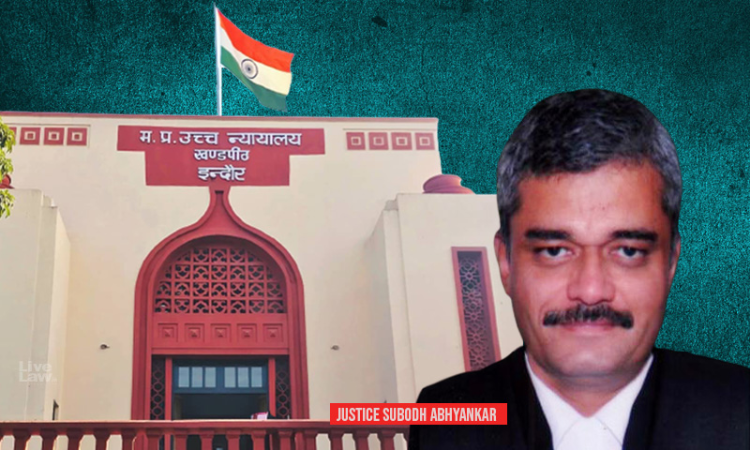- Home
- /
- High Courts
- /
- Madhya Pradesh High Court
- /
- In 'Blatant Case Of Corruption'...
In 'Blatant Case Of Corruption' Accused Can't Claim Suspension Of Sentence As A Right Citing Delay In Appeal Disposal: MP High Court
Anukriti Mishra
28 May 2025 1:45 PM IST
While dismissing an application for suspension of sentence, the Madhya Pradesh High Court observed that in cases of blatant corruption, the accused cannot claim suspension of sentence as a matter of right merely because the appeal is not likely to be heard at an early date.Justice Subodh Abhyankar in his order observed, “In the present case, it is found that the date of incident is...
While dismissing an application for suspension of sentence, the Madhya Pradesh High Court observed that in cases of blatant corruption, the accused cannot claim suspension of sentence as a matter of right merely because the appeal is not likely to be heard at an early date.
Justice Subodh Abhyankar in his order observed, “In the present case, it is found that the date of incident is 01.01.2019, but prior to his conviction, the appellant has not spent even a single day in jail and that too despite being caught red-handed in a trap laid by the Lokayukt Police. This Court is also of the considered opinion that in such cases of blatant corruption in public domain, which have been found to be proved by a court of competent jurisdiction after appreciating the evidence adduced by the parties on record, merely because the appeal is not likely to be heard at an early date, the appellant cannot claim the suspension of sentence as a matter of right no sooner he files the appeal, as that would not only also send a wrong message to the public but would also encourage such accused persons who may believe that they can always get away even if they are caught red-handed while accepting the bribe.”
An application for suspension of sentence on behalf of the appellant was filed under Section 430 of Bhartiya Nagrik Suraksha Sanhita, 2023. The appellant was convicted under Section 7 of Prevention of Corruption Act, 1988 and was sentenced to undergo 4 years of R.I. with fine of Rs. 2,000/- and default stipulations.
As per the factual matrix of the case, the appellant was posted as a Reader/Assistant Grade-III in the office of the Sub Divisional Magistrate and it was alleged that he demanded a bribe of Rs. 5,000/- from the complainant. The demand was raised on account of grant of permission for digging the tube-well, and after certain negotiation, the amount was agreed at Rs. 3,000/-, and consequently, he was caught red-handed along with the amount of Rs. 3,000/- which he had obtained from the complainant.
The counsel for the appellant submitted that the case is marked by various illegalities as under the Prevention of Corruption Act, the investigation has to be conducted by an Officer not below the rank of Deputy Superintendent of Police. However, in this case, the investigation was conducted by an Officer holding the rank of Inspector only.
It was further submitted that the appellant has also proved his enmity with the complainant, which fact has not been taken into consideration by the trial Court. The counsel argued that the transcript of the conversation between the appellant and the complainant could not have been relied upon in the absence of the original voice record, as only the memory card has been proved.
Counsel for the appellant also relied on the case of Sohail Gohar vs. The State of Madhya Pradesh (2025) where the Supreme Court has deprecated the practice of rejecting the suspension applications of the accused persons when the final hearing of the appeals itself is not possible in the near future.
On the contrary, the counsel for the respondent referring to the transcript between the appellant and the complainant submitted that it can be clearly made out that the appellant had demanded the sum of Rs. 5,000/- from the complainant and the matter was finally settled at Rs. 3,000/-which was recovered from the front pocket of the appellant's pants.
After considering the submissions, the Court noted that the Trial Court Judge had dealt with all the objections raised by the appellant and after appreciating the entire evidence, he concluded the involvement of the appellant in the case. Therefore, the High Court opined that it was not a fit case for grant of bail.
“…this Court is also of the considered opinion that in corruption cases, specially the case in which a person has been caught red-handed, after his conviction by the trial court, he cannot claim the suspension of jail sentence as a matter of right. In fact, there is a purpose behind introduction of Section 389 of Cr.P.C. or Section 430 of BNSS, which empowers to court to use its discretion while allowing or rejecting an application for suspension of sentence, and in appropriate cases the sentence is also required to be suspended.”, the Court said.
Stating that the case relied upon by the appellant is of no avail to him, the Court clarified that if the appellant's contention is accepted, then in every case falling under the P.C. Act, or even a case u/s.302 of IPC, the suspension of sentence should be granted to the appellants no sooner the appeals are filed by them since in every case, the final disposal of the appeal is likely to take sufficiently long time looking to the scarcity of the judges and the long list of pending appeals.
The application was hence, dismissed.
Case Title: Manish Vijayvargiya Vs State Of Madhya Pradesh, CRA No. 3832 Of 2025
Counsel for Appellant: Advocate Raghvendra Singh Raghuvanshi
Counsel for Respondent/SPE, Lokayukt: Advocate Prasanna Prasad



